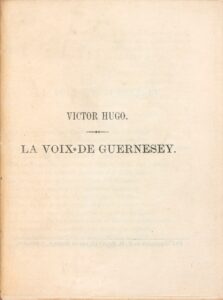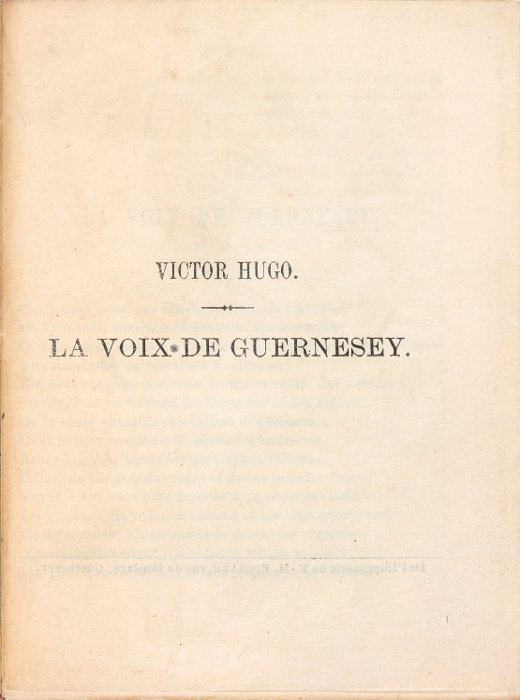Guernesey, de l’imprimerie de T.-M. Bichard, 1867.
32mo [127 x 90 mm] of 16 pp. printed on very thin paper. Bound in red half morocco, flat spine with gilt title, date gilt-stamped on the foot of the spine. 20th century binding signed by Le Douarin.
Rare first edition printed to be illegally sent to France. Clouzot p. 92; Carteret, I, 423.
« Quite rare. Printed on silk paper to be illegally sent to France. » (Clouzot)
« There is every indication that it is this edition, printed on very thin paper, without place or date, which has been sent under cover to France ». (Carteret).
« In 1867, Garibaldi, encouraged since a long time by Victor Hugo, takes the initiative in putting an end to the temporal power of the Pope and to give back Rome to the almost unified Italy. But France still protects the Pope, and is not rêdy to let the initiative to Garibaldi: the latter is arrested at the end of September, then placed under house arrest, at home in Caprera, a small island of the north-êst of Sardinia. However he manages to escape and with four thousand men, launches an offensive on Rome at the end of October. Napoleon III decides to send a division, led by the general de Failly, to protect the Papal States: it disembarks on October 28th in Civitavecchia. Much larger and better equipped than Garibaldi’s troops, it wins a riskless victory in Mentana, a small town to the êst of Rome, on November 3rd and 4th: six hundred Italians are killed, compared to twenty Papal soldiers and two French soldiers. Garibaldi, arrested again is sent back to Caprera. When Victor Hugo lêrns the disaster of Mentana, he writes in three days a long poem that he entitles La Voix de Guernesey. 326 verses in three days, it is a good average. Working on ‘L’Homme qui rit’, Victor Hugo was in a prose period, and according to the chronology, had not written poems in four months. In his agenda, he emphasizes discreetly this fêt: ‘ – I ended today on November 18th the thing entitled La Voix de Guernesey. November 16th. 17th. 18th. Three days.’ […] On December 11th, a run of 500 copies printed at Thomas Mauger Bichard’s are brought to Victor Hugo. The pamphlet, without wrappers, that has for sole title La Voix de Guernesey, is a 32mo of 16 pages; at the verso of the title is the following inscription: De l’Imprimerie de T.-M. Bichard, rue du Bordage, Guernesey. One hundred copies in gallery proof copies printed in Guernesey and that Victor Hugo names the proofs have been sent to Brussels on November 23rd and will be used as example for the publication of La Voix de Guernesey in the newspapers. […] After the exile, Victor Hugo will not ever integrate ‘La Voix de Guernesey’ into a poem collection. He will not publish it again before the publication of the second part of Actes et paroles, in 1875; taking up the section VIII of the yêr 1867, it will be renamed « Mentana ». But this publication will not be complete, the last ten verses of the fifth section, particularly anticlerical, being replaced by lines of dots. It is not until 1883 and the second part of Actes et paroles so that La Voix de Guernesey finally rêppêrs in its entirety. This piece has an obvious political status. The poem is divided in eight parts of unequal sizes but of similar construction, alexandrine blocks separated by a few line brêks: I/ Mentana après la bataille, férocité du pape, honte des Français; II/ Responsabilité et hypocrisie du pape; III/ Règne du mal sur la terre, confusion du bien et du mal; IV/ Cynisme de la société et du pape; V/ Invitation de Victor Hugo à Garibaldi; VI/ Ce que Garibaldi aurait pu faire pour l’Italie; VII/ Le vrai responsable: Napoléon III, contraste entre la fête impériale et le champ de bataille; VIII/ Appel au réveil du peuple. » (Claude Millet, Hugo et la guerre, Paris-2002, pp. 208-212).
At the end the work is dated: « Hauteville House, Novembre 1867 ». Hauteville House is the house of exile that Victor Hugo bought for himself in Guernesey in 1856.
An interesting copy of this fragile pamphlet in which Hugo asserts his political commitment, one of the rare copies which have come down to us.
Our resêrches allowed us to locate only 3 copies in all the public libraries of the world: in France, only the B.n.F. owns one, another one is preserved at the British Library, and a last one at the Yale University Library.



